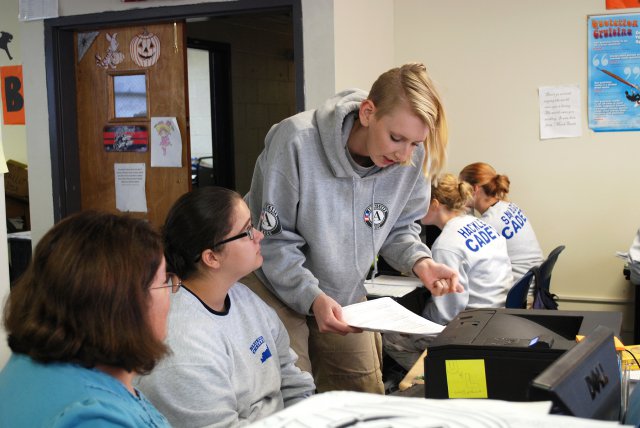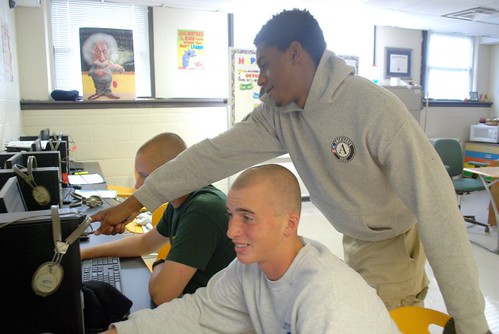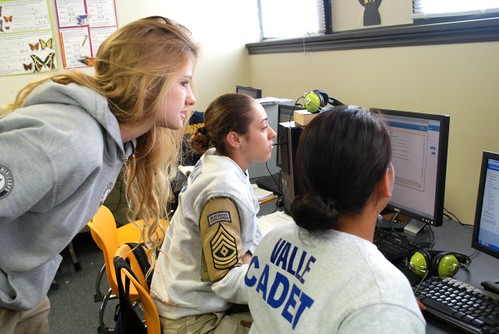By Rachael Tolliver, The Gold Standard
[caption id="" align="aligncenter" width="568"]

Janna Jesson, an AmeriCorps National Civilian Community Corps member, reads over a writing assignment from Tori Burton of Somerset, Kentucky at the Bluegrass Challenge Academy in Fort Knox, Ky. With her background in English and communication, Jesson helps tutor students in writing and grammar. (Photo by Rachael Tolliver)
FORT KNOX, Ky. -- Once in a while we all find ourselves adrift, in need of a helping hand, a leg up and a push onward.
For at-risk teens who live in Kentucky that help comes in the form of a second chance with the Bluegrass ChalleNGe Academy. But before you get the impression that "academy" means fancy, privileged boarding school, think again.
The teens admitted to this school are here as an alternative to dropping out of school and the academy is set up with a quasi-military format. Most of the kids who attend the academy need structure and discipline, a value system and an understanding adult.
They also receive tutoring in educational studies, working in groups, sharing, and learning leadership--all skills they don't usually have when they enter the academy.
And the BGCA is run by an organization who knows structure, discipline, values and hard work--the Kentucky National Guard. But this year, for the first time, the KYNG joined forces with AmeriCorps--a partnership that has shown untold advantages.
[caption id="" align="alignright" width="380"]

Thomas Ventura, who was a "challenge kid", discuss an assignment about which two cadets have asked questions at the Bluegrass Challenge Academy at Fort Knox, Ky. (Photo by Rachael Tolliver)
"This is a great partnership and a uniquely wonderful opportunity for our cadets to be mentored by AmeriCorps volunteers," said Kentucky National Guard Maj. Jake McKinney, the program's director. "The young adults with AmeriCorps are from all over the country. As such, they can bring different experiences and regional culture to the table which helps expose the cadets, who are all from Kentucky, to different ways of doing things, people and backgrounds. Also, our cadets are more comfortable talking to them as mentors because the age gap isn't very large between the two groups."
McKinney explained that because the AmeriCorps staff is considered cadre, but is not part of the discipline process and since most of them are in their late teens and early 20s, the cadets at BGCA find it comfortable to discuss things with them. This has led to, what he said he feels, is a great learning tool.
"We've seen a great deal of success because AmeriCorps is fully integrated with the cadets--for example, they are doing life skills training, tutoring the cadets in academics and daily PT," he noted.
"They do everything from helping with classwork to tutoring remedial reading and math. This integration helps with the bond AmeriCorps staff needs to develop trust as mentors."
Janna Jesson, an AmeriCorps-National Civilian Community Corps member, was one of the volunteers to work at the BGCA this fall. And she had a unique perspective from which to draw.
"I was in foster care at several points in my childhood," she explained. "I had an abusive father and struggled with homelessness as well. Because of my personal history, I feel like I can relate to the kids and understand their apprehensions with authority."
Jesson, who is starting graduate school for English and communication, added that from her personal experiences she understands how important it is for the kids to know that there are boundaries, limits, and rules in life that are often enforced for their own safety.
[caption id="" align="alignleft" width="382"]

Ashley McCane, a nurse who is participating in the AmeriCorps Program, answers questions from cadet 1st Sgt. Lily Bowman of Elizabethtown, and Vianey Valle of Lexington at the Bluegrass Challenge Academy at Fort Knox, Ky. McCane said she joined AmeriCorps because she was interested in the Peace Corps and thought she would try projects in the U.S. first. (Photo by Rachael Tolliver)
She added that it's important to have discipline, receive encouragement and the kids can get it here when there is an absence of it in the home. And this knowledge was helpful in her mentoring of the cadets.
"One girl asked me why they all have to wear the same clothes and walk the same way and do the same things the same way." Jesson recounted. "I told her it's about how they (cadets) act and behave, and it's about character. That's what will set them aside and 'all the same' makes them equal. And society wants people of character--it's not about what you wear or what you own."
All the AmeriCorps NCCC volunteers bring something different and unique to the table--and each is a skill that helps the BGCA and the cadets it serves. For example, Ashley McCane is a nurse who used the program as a refresher for basic nursing skills. Because of her job, and her love of teaching and education people on health issues, she was the perfect person to pull together a presentation for the BGCA nurse on sexually transmitted disease prevention and education for a presentation to the cadets. She was also hoping to teach a substance abuse class before she leaves.
And for Seatra Hudson, an AmeriCorps volunteer from the Bronx in New York, who studied early childhood education, and works with infant, toddlers and mentally disable adults, BGCA was a place to share the knowledge and experience she has gained from her job. It also let her learn some new skills.
McKinney said that BGCA is an amazing resource for children across the state who are struggling with life at home or in school and that the two programs in Kentucky--the other is in Harlan--are a unique alternative for the kids.
The program is of military structure with hybrid education structure and offered at no cost to the participants. But having a partnership with AmeriCorps has only helped the cadets and the program as a whole. And, to make the experience more complete, where most of the students are in "credit recovery," they will soon only have to transfer credits from the school they leave when they come to BGCA.
"We are in the process of getting certified as an alternative accredited school," McKinney, a former principal turned teen-program manager, said. "Jefferson County public school would be the district in which we would be assigned as an alternative accredited school. It's a work in progress for us. Harlan Appalachian Academy is the process of working with Harlan County Schools for its certification."
But the success of any program is sometimes best judged looking at those who have already successfully completed it.
Thomas Ventura is originally from Aberdeen, Maryland, and was a "challenge kid" in Maryland's version of the BGCA. He said that thanks to the program he now has a will to do something, has a purpose and is more disciplined and more hard-charging. But it didn't start out that way.
"I used to be defiant and rebellious but being in a challenge academy for five months makes you see where you could be with hard work," he explained. "You really have to work to get to different places and earn privileges. And I wasn't in trouble all the time and that helped."
He added that the academy teaches thought process and how to make good decisions which shows the students how to look ahead and makes them think about their choices and what they can gain or lose.
Ventura said he joined AmeriCorps to get his GED, and because he wanted to travel, to network, to experience diversity and he really wanted to work on leadership skills. But he said that, overall, his main purpose was to serve.
"Anyone who goes through challenge has a story and has a voice," he explained. "If I can change that and if I can show people the difference that can be made in one year-- that' a good motivator. They can see themselves through me.
"I see myself in them in so many ways and I can see the good things they can do. The challenge academy proves that if I can do it, anyone can."